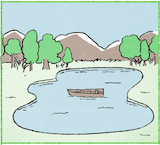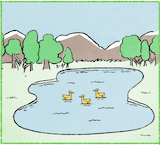


นี้คืออี่หยัง อันนี้เป็นหนองน้ำ หลือสะน้ำนั้นหละ
อยู่ข้างหลังหนองน้ำมีอี่หยังแน่ กะสิมีหลายอย่าง มีต้นไม้พ้อม มีต้นไม้หลายต้น
อยู่ข้างหลังต้นไม้หนั้น หลืออยู่ทางหลังป่าไม้หนั้น กะสิเป็นพูเขา มีพูเขาพ้อม พูเขาลูกบักใหญ่หนึ่ง
19
นี้คืออี่หยัง อันนี้กะเป็นเลีย
เป็นเลียลอยอยู่ในหนองน้ำ เป็นเลียลำหนึ่ง
เลียนี้ใซ้เฮ็ดอี่หยัง เอาไว้ถ้านั่ง หลือเอาไว้ถ้าขี่ หลือเอาไว้ถ้าใซ้งานอยู่ในหนองน้ำนั้นหละ
เลียนี้เฮ็ดมาจากอี่หยัง เลียนี้เฮ็ดมาจากไม้ เฮ็ดมาจากขอนไม้ใหญ่ๆ หลือเฮ็ดมาจากลำต้นไม้ที่มันมีต้นใหญ่ๆ
แล้วอยู่ข้างหลังหนองน้ำ หลือข้างหลังเลียนี้ มีอี่หยังแน่ กะสิมีต้นไม้คือเก่านั้นหละ มีต้นไม้หลายต้น หลือเป็นป่าไม้นั้นหละ แล้วกะสิมีพูเขาพ้อม เป็นพูเขาน่วยบักใหญ่หนึ่ง มีหลายน่วยเอาโลด
20
นี้คืออี่หยัง อันนี้เป็นเป็ด
แล้วมันเฮ็ดอี่หยังอยู่ เป็ดซุมนี้มันเฮ็ดอี่หยังอยู่ มันกำลังลอยน้ำอยู่ กำลังลอยน้ำอยู่ในหนอง
จักมันลอยเฮ็ดหญังกะบ่ฮู้ อาดสิหากิน หลือสิหากินเญี่ยกะได้
เป็ดซุมนี้มีจักโต เป็ดซุมนี้มีสามโต มันลอยอยู่น้ำนั้นสามโต
Link to overview page
Link to dictionary
| Isaan | Pronunciation | Tones | Thai | English/Notes |
|---|---|---|---|---|
| นี้ | ni: | HF | นี้ | 1. this 2. here |
| คือ | khʉ: | HR | คือ | 1. to be, to resemble, like, as 2. why {บักหล้าคือบ่เก็บโต่ะแน่ = [addressing a young boy] Why haven't you cleared the table?} |
| อี่หยัง | i:-yaŋ | H-M | อะไร | 1. what {นี้คืออี่หยัง = What is this?} {มื้อนี้เจ้าเฮ็ดอี่หยัง = What are you doing today?} {กินเข้างายกับอี่หยัง = What did you have for breakfast?} 2. something, anything, (in negations) nothing {บ่ต้องเฮ็ดอี่หยังอีกเลยนอกจากใส่ปุย = [we] don't need to do anything besides adding fertilizer} |
| อัน | an | M | อัน | 1. thing, object 2. general clf. for objects |
| เป็น | pen | M | เป็น | 1. to be, to exist 2. to be able to 3. to suffer, sth. happens to 4. เป็นหญัง[...]คือ in initial position: why? {เป็นหญังเขากะคือแปงฟัน = Why is he brushing his teeth?} {เป็นหญังเคี่ยงบินมันคือสิตก = Why is the airplane falling down?} |
| หนอง | nɔ:ŋ | M | หนอง | lake, pond, swamp |
| น้ำ | na:m | HF | น้ำ | 1. water 2. drink, soft drink, juice |
| หลือ | lʉ: | M | หรือ | or |
| สะ | sa | M | สระ | pool Notes: see also สะหว้ายน้ำ |
| นั้นหละ | nan-la | HF-M | นั่นแหละ | auxiliary for emphasis at the end of a phrase |
| อยู่ | yu: | H | อยู่ | 1. to be (located) at 2. yet, still 3. auxiliary indicating continuous or progressive action {ทอดปาอยู่ในกะทะ = (in the process of) frying a fish in the pan} {แม่กำลังเมี้ยนเฮียนอยู่ = mother is cleaning/tidying up the house} |
| ข้างหลัง | kha:ŋ-laŋ | LF-M | ข้างหลัง | behind, in the back of |
| มี | mi: | HR | มี | 1. to have 2. there is |
| แน่ | nɛ: | H | แน่, บ้าง | 1. some, somewhat 2. final particle, used to ask for examples (similar to Thai บ้าง at the end of a question) {หม้อใซ้เฮ็ดอี่หยังได้แน่ = What (different things) can a pot be used for?} {น้ำอัดลมซื้อได้อยู่ใสแน่ = Where/in which places can one buy soft drinks?} 3. final particle, when giving examples {มีเทิงส้งแน่ มีเสี้ยแน่ มีเกิบแน่ = there are trousers, shirts, shoes etc.} 4. final particle, used to give a command {ไปปิดหน้าต่างให้แน่ = Close the window!} 5. final particle, acting as an intensifier, especially in the pattern ... คัก ... แน่ {สูงคักสูงแน่ = very high} {ญ้องเฮาคัก ญ้องเฮาแน่ = [he's] praising me a lot} |
| กะ | ga | M | ก็ | 1. then, consequently 2. also |
| สิ | si | M | จะ | future tense auxiliary {เขากำลังสิตื่น = he's about to wake up} {สิไปตะหลาด = [I'm] going to the market} |
| หลาย | la:i | M | เยอะ, มาก | many, much, very |
| อย่าง | ya:ŋ | H | อย่าง | type, kind, sort, category |
| ต้นไม้ | ton-mai | HF-HF | ต้นไม้ | tree |
| พ้อม | phɔ:m | HF | พร้อม | at the same time, also, too {มีตะเว็นพ้อม = the sun's out, too} {กะทะมีด้ามพ้อม = the pan has also a handle} |
| ต้น | ton | HF | ต้น | 1. clf. for trees, plants, logs/pieces of wood {ต้นไม้ต้นใหญ่ = a large tree} {ต้นฟืน = log/piece of wood} 2. first, primary, initial {ลูกคนต้นหมู่ = first child} |
| หนั้น | nan | LF | นั้น | that, there Notes: possibly a variant of นั้น or หั้น |
| ทางหลัง | tha:ŋ-laŋ | HR-M | ทางหลัง | backward, at/on the back (of) |
| ป่าไม้ | pa:-mai | H-HF | ป่าไม้ | forest |
| พูเขา | phu:-khao | HR-M | ภูเขา | mountain |
| ลูก | lu:k | HF | ลูก | 1. child 2. clf. for balls, fruits (lime), mountains |
| บัก | bak | M | 1. intensifier before adjectives {ปาโตบักใหญ่ = a (very) large fish} 2. prefix in front of fruits and vegetables {บักแตงโม = watermelon} 3. can be used as a reference for a male person of the same or younger age {บักอันนี้ = this lad} |
|
| ใหญ่ | ɲai | H | ใหญ่ | large, big |
| หนึ่ง | nʉŋ | H | หนึ่ง | 1. one 2. after adjective: intensifier {บักคักหนึ่ง = very much} {อันบักใหญ่หนึ่ง = very large}, or attenuates the meaning {กะดาดมันแผ่นน้อยๆ หนึ่ง = the piece of paper is [relatively] small} |
| เลีย | li:a | HR | เรือ | boat Notes: pronunciation: also realized as เลือ |
| ลอย | lɔ:i | HR | ลอย | 1. to float, to swim 2. to soar 3. smoke/steam: to rise |
| ใน | nai | HR | ใน | in, within |
| ลำ | lam | HR | ลำ | clf. for airplanes, boats, tree trunks |
| ใซ้ | sai | HF | ใช้ | to use |
| เฮ็ด | het | H | ทำ | to do, to make |
| เอา | ao | M | เอา | to take, to give {เขากำลังเอาก่องไปซั่ง = he's taking the boxes to weigh them} {หมอกำลังเอายาให้คนป่วยกิน = the doctor is giving medicine to the patient} {เอาไว้ถ้า = is for, is used for, has the purpose of} |
| ไว้ถ้า | wai-tha: | HF-LF | usually in a positive statement or answer: is for, is used for, has the purpose of {กะทะมีไว้ถ้าทอด = a pan is for frying} {น้ำบักนาวมีไว้ถ้าปุงอาหาน = lime juice is used to season food} {ปากกามีไว้ถ้าเขียน = a pen is for writing} {กะเทียมเอาไว้ถ้าเฮ็ดแนวกิน = garlic is used to make food} {ขาเอาไว้ถ้าญ่าง = legs are for walking} {เกิบเอาไว้ถ้าใส่ = shoes are for wearing} Notes: see also ไว้ |
|
| นั่ง | naŋ | H | นั่ง | to sit |
| ขี่ | khi: | H | ขี่ | to ride, to drive {ขี่มอเตอไซ = to ride a motorbike} {ขี่ควย = to ride on a buffalo} {ขี่เลีย = to take or travel on a boat} |
| ใซ้งาน | sai-ŋa:n | HF-HR | ใช้งาน | to use, to put to use |
| มา | ma: | HR | มา | 1. to come 2. auxiliary expressing action towards the present or focal time {กะคุเฮ็ดมาจากอี่หยัง = What is the bucket made of?} {แล้วเขากะเก็บเงินจากพุนั้นมา = and then she takes the money of that person} |
| จาก | ja:k | LF | จาก | 1. from {... เฮ็ดมาจากอี่หยัง = ... is made from what?} 2. to depart |
| ไม้ | mai | HF | ไม้ | wood, tree |
| ขอนไม้ | khɔ:n-mai | M-HF | ขอนไม้ | log |
| ลำต้น | lam-ton | HR-HF | ลำต้น | trunk, stem |
| ที่ | thi: | H | ที่ | 1. that, which {คนที่ยืนอยู่ฝั่งขวา = the person which is standing on the right = the person standing on the right} {เว้าคำที่บ่สุพาบ = to speak words which are impolite = to speak impolitely} 2. for ordinal numbers {ที่สาม = third} |
| มัน | man | HR | มัน | it (also used to refer to people) |
| แล้ว | lɛ:o | HF | แล้ว | 1. finished 2. already 3. and then, and next (especially แล้วกะ) 4. auxiliary for past tense |
| คือเก่า | khʉ:-gao | HR-H | as before | |
| น่วย | nu:ai | H | ลูก, ผล | clf. for the fruits (e.g., banana, coconut, lime, papaya, watermelon), vegetables (e.g., chilis), eggs, mountains, the sun |
| เอาโลด | ao-lo:t | M-HF | เอาเลย, ทำเลย, จริงๆ | in final position: intensifier {โตส่ำกะทะเอาโลด = [a fish] as large as the pan!} {เกียบเต็มถ้วยเอาโลด = the bowl is almost full!} {ทะนาคานมันสิไปตั้งไว้อยู่ซู่หม้องเอาโลด = banks are everywhere!} |
| เป็ด | pet | M | เป็ด | duck |
| ซุม | sum | HR | พวก, กลุ่ม | 1. group, team 2. set, kind |
| กำลัง | gam-laŋ | M-HR | กำลัง | auxiliary indicating continuous or progressive action |
| จัก | jak | M | จัก | 1. answer to a question: [I] don't know, don't know exactly, [I'm] not sure {พุซายคนนี้เขาเถ้าไป่ จัก จักเถ้าหลือบ่เถ้า เบิ่งบ่ค่อยออก = Is this man here already old? I don't know. I can't see clearly whether he's old or not.} {เขาเว้ากันอยู่ใส จักคือกัน = Where are they talking? I don't know either.} 2. exact(ly), what exactly {จักต้มอี่หยังกะบ่ฮู้ = I don't know what (exactly) he is cooking} {บ่ลู้คือกันจักปาอี่หยัง = I don't know either what kind of fish this is} 3. how much/many? {ต้นไม้มีจักต้น = How many trees are there?} {ตอนนี้จักโมงแล้ว = What time is it now?} {มือของเฮานี้สิมีจักนิ้ว = How many fingers do our hands have?} 4. a bit, a little bit {จักหน่อย/จักหน่อยหนึ่ง = a bit, a little bit} |
| หญัง | ɲaŋ | M | อะไร, เป็นหญัง = ทำไม | 1. what {เขากำลังเฮ็ดหญัง = What is he doing?} {ธูปเอาไว้เฮ็ดหญัง = What are incense sticks for?} 2. something, anything, (nothing) 3. เป็นหญัง[...]คือ in initial position: why {เป็นหญังเขาคือใส่บักพิกลงไปในกวยเตียว = Why is he putting chili in [his] noodle soup?} {เป็นหญังหน้าต่างมันคือเปิด = Why is the window open?} {เป็นหญังมันคือมีควนไฟ = Why is there smoke?} |
| บ่ | bɔ: | H | ไม่ | 1. no, not 2. question particle, transforming a statement into a question Notes: spelling exception in line with common usage on social media |
| ฮู้ | hu: | HF | รู้ | 1. to know 2. to understand Notes: equivalent to ลู้ |
| อาด | a:t | LF | อาจ | 1. might, may, will 2. likely |
| หา | ha: | M | หา | to look for, to find |
| กิน | gin | M | กิน | to eat, to consume, to use |
| เญี่ย | ɲi:a | H | อาหารของสัตว์ เช่น ไก เป็ด นก | food for chicken, birds etc. |
| ได้ | dai | HF | ได้ | 1. can 2. to get, to obtain 3. before verb: indicating past tense 4. บ่ได้ + verb: not |
| โต | to: | M | ตัว | 1. body, self 2. clf. for animals, characters/letters/consonants, appliances, clothes (e.g., pairs of trousers, shirts) |
| สาม | sa:m | M | สาม | three |
| นั้น | nan | HF | นั้น | that, there |